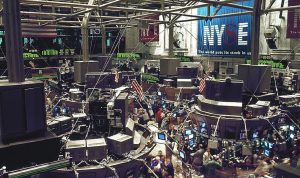Political Headlines That Dominated National News Cycles set the stage for a riveting exploration of how specific events and issues shaped public discourse and influenced policy decisions. From election outcomes to pivotal legislative changes, these headlines capture the essence of our political landscape, serving as markers of societal priorities and challenges.
In an era where information travels at lightning speed, the impact of these headlines extends beyond mere news; they reflect the dynamics of power, the voice of the populace, and the intricate dance of democracy. As we peel back the layers of these significant stories, we gain insight into the collective consciousness of a nation and the factors steering its course.
In the ever-evolving landscape of technology, one cannot overlook the profound impact that Artificial Intelligence (AI) has had on our daily lives. From personal assistants like Siri and Alexa to complex data analysis systems that drive business decisions, AI is embedded in countless facets of modern society. This article aims to explore the various dimensions of AI, its applications, challenges, and the ethical considerations that come into play as we continue to integrate this powerful technology into our lives.
To begin, it’s crucial to define what AI is. At its core, AI refers to the simulation of human intelligence processes by machines, especially computer systems. These processes include learning, reasoning, problem-solving, perception, and language understanding. AI can be categorized into two main types: narrow AI, which is designed for specific tasks, and general AI, which possesses the ability to understand, learn, and apply intelligence across a broad range of tasks—much like a human being.
As of now, we primarily operate within the realm of narrow AI, which includes applications such as chatbots, recommendation systems, and image recognition software.

One of the most significant applications of AI can be found in the realm of healthcare. The medical field has seen a surge in AI-driven technologies that enhance patient care, streamline administrative processes, and improve diagnostic accuracy. For instance, AI algorithms can analyze medical images to detect anomalies that might be missed by the human eye, leading to earlier interventions and improved outcomes.
Additionally, AI-powered predictive analytics tools can help healthcare providers anticipate patient needs, optimize resource allocation, and reduce costs.
Another sector where AI has made a notable impact is finance. Financial institutions leverage AI to enhance fraud detection, manage risks, and improve customer service. Machine learning models analyze transaction data in real-time to identify suspicious activities and alert authorities, thus protecting both businesses and consumers from potential fraud. Furthermore, robo-advisors, powered by AI algorithms, provide personalized investment advice, allowing individuals to manage their portfolios without the need for traditional human advisors.
The retail industry has also embraced AI technologies to transform the shopping experience. From personalized marketing campaigns to smart inventory management systems, AI helps retailers optimize their operations and enhance customer satisfaction. For example, recommendation engines analyze customer behavior to suggest products, ensuring that shoppers are presented with items that align with their preferences. Furthermore, AI can predict inventory needs based on historical data and trends, reducing the likelihood of stockouts or overstock situations.
Despite the numerous advantages that AI offers, the technology is not without its challenges. One major concern is the potential for job displacement as automation becomes more prevalent. Industries such as manufacturing, customer service, and transportation are particularly at risk, as AI systems are capable of performing tasks that were once solely the domain of human workers. While some argue that AI will create new job opportunities, the transition may not be seamless, and many workers may find themselves needing to reskill or upskill to remain relevant in the job market.
Moreover, the ethical implications of AI cannot be ignored. Issues such as bias in AI algorithms, privacy concerns, and accountability for AI-driven decisions are critical considerations that society must address. For instance, if an AI system is trained on biased data, it may produce skewed outcomes that perpetuate existing inequalities. This is particularly concerning in fields like criminal justice, where biased AI systems could lead to unjust sentencing or profiling.
Therefore, it’s essential for developers and organizations to prioritize fairness, transparency, and accountability in AI systems.
Another ethical consideration revolves around privacy. As AI systems gather and analyze vast amounts of data, there is a growing concern over how that data is collected, stored, and used. Individuals may unknowingly provide personal information that can be exploited for commercial gain or even surveillance purposes. Striking a balance between leveraging data for AI advancements and respecting individual privacy rights is a challenge that requires careful consideration and robust regulatory frameworks.
Looking ahead, the future of AI is filled with possibilities. As technology continues to advance, the potential for AI to drive innovation across various sectors is immense. However, realizing this potential will require collaboration among technologists, policymakers, and ethicists to ensure that AI developments are aligned with societal values and benefit humanity as a whole. By fostering an environment of responsible AI development and implementation, we can harness the power of technology while mitigating the risks associated with its use.
In conclusion, AI is a transformative force that is reshaping our world in ways we are just beginning to understand. Its applications across healthcare, finance, retail, and many other domains demonstrate its potential to improve our lives and drive economic growth. However, as we navigate the complexities of this technology, we must remain vigilant in addressing the challenges it presents, particularly concerning job displacement and ethical considerations.
By doing so, we can pave the way for a future where AI works in harmony with humanity, amplifying our capabilities while maintaining our values.
Common Queries: Political Headlines That Dominated National News Cycles
What criteria determine a political headline’s significance?
Significance is often based on the headline’s impact on public opinion, potential policy changes, and its ability to resonate with societal issues.
How do political headlines influence public perception?
They shape narratives, highlight key issues, and can sway voters’ opinions, ultimately affecting political engagement and decision-making.
Are there trends in political headlines over the years?
Yes, trends often reflect broader societal changes, such as shifts in political party dynamics, emerging social movements, and technological advancements in media.
How do journalists decide which headlines to feature?
Journalists consider relevance, public interest, and the potential for impact when selecting headlines to feature in news cycles.
What role do social media play in the dissemination of political headlines?
Social media amplifies the reach of political headlines, allowing for rapid sharing, diverse viewpoints, and increased public engagement.






